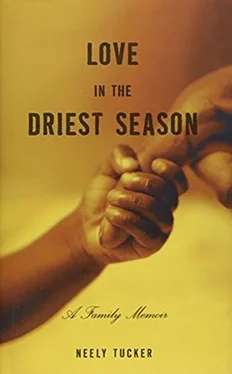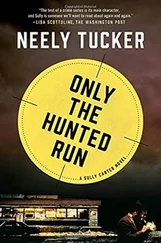We were married at our house in Poland the following September.
My family boycotted the ceremony-they didn’t approve of our marriage, to put it mildly. Vita’s father had died, her mother was too old to travel, and her brothers and sisters sent their regards. It was her second marriage and seen as something of a lark.
“What does she want with that little white boy?” Vita’s mother, Ida Helen, asked Kathie, Vita’s youngest sister. “Is the girl just lonely?”
“Mama,” Kathie sighed, “black people do not move to Poland because they’re lonely.”
We jumped the broom in a rollicking party in our backyard, on Warsaw’s Pilicka Street, Al Green’s chorus from “Let’s Stay Together” on the invitations and twenty-eight guests from eight countries on four continents jamming to what sounded like a Belle Isle street party back in Detroit. The house came down when Patricia Wicks, Vita’s best friend from childhood, showed the inebriated Polish wedding photographer how to bend over and dance to “Shoop.”
I wasn’t bothered by my family’s snub of our wedding. In fact, very little bothered me anymore. I had developed a certain harshness after leaving Mississippi, a play-it-as-it-lays mind-set that was attuned to the bitterness in the world. I had the working idea that there was a higher form of truth to be found in the world’s most impoverished and violent places, a rough-hewn honesty that could not be found elsewhere. Life had a tautness to it there, a sheen that seemed to say something about the way the world was, not how anyone wanted it to be. That was what seemed true and honest, and that was what I tried hardest to write about.
Given that, I found myself in the world of foreign correspondents and roving reporters. It was the first time in my adult life that I felt like I was where I belonged. I loved it-the travel and challenges, the friends flung out in a wide orbit of countries, getting on a plane time and again to write about the most compelling international events of the day-and at the end of each trip, there was Vita, my best friend, wife, and confidant. We went dancing till the clubs closed, had champagne brunches with friends that lasted all afternoon. So when Nancy Laughlin, the Free Press foreign editor, called our home in Warsaw one snowy evening and asked if I’d like to take the paper’s Africa posting, I said sure. It was the most wide-open job in journalism as far as I was concerned. To Vita, the chance to live on the mother continent was irresistible. We had all of our belongings in storage back in Detroit shipped to Zimbabwe.
We had no intention of returning to the United States.
AN OLD LAND ROVER came bumping down the red dirt road and slowed to a stop. Two police officers got out. It had taken several hours, but the young man Herbert sent running for help had finally reached the nearest police outpost. In rural Zimbabwe, where villages are scarce and paved roads are few, that was more marathon than sprint. He had hitched a ride on a bread truck for the first few miles, got off when the truck turned at an intersection, then walked and hitched again for several more miles until he came to a dusty clutter of one-story concrete-block shops. He walked past the butcher’s and the beer hall, turned through an open field, and came to a police barracks. He told an officer a newborn child had been found.
The officer sighed-this was not the first time this had happened-and placed a call to a police station in the nearest town for a truck to be dispatched. More than twenty miles away, all on dirt roads, the truck took a while to appear.
The officers eventually made their way, the young boy as their guide. Herbert was relieved. The child was in great distress. The women had rocked and comforted her, but she needed a doctor, and soon. One of the officers took the child to a clinic, perhaps five miles away, where she would spend the night. The other officer stayed to ask questions. Abandoning a child was a criminal charge. Attempted murder might be added by a stern prosecutor. Had there been pregnancies in the village? Had any young girls suddenly gone to visit relatives? No, none, said the women. Herbert concurred.
The officer walked the paths, looking for something, anything-a note, a scrap of clothing-that might serve as a clue. There was nothing. Then he followed his partner to the clinic, where he questioned the staff. Had there been deliveries? Did they know of anyone who had come in for pregnancy or health counseling? None. He returned several weeks later, asking the same questions, trying to catch someone in a changed story, but got the same results. Three months later, he would close the case. More than two dozen infants had been mysteriously abandoned in his precinct alone in recent months.
“The children are not there in the evening, then they are in the morning,” he said later. “Some are found close to roads. Others are dropped into sewers or ditches. We only find the corpses when people tell us about them. I think it is the mothers who leave them, because the fathers are gone, but it is only my theory. Who can say where they come from?”
The wave of abandoned children was unprecedented in the nine hundred years since the Shona-speaking people had built dzimba dzimbabwe, the magnificent stone fortress on the southern plains that formed the cornerstone of the national identity. There had always been isolated cases of abandonment, children set down in the forests for the animals to find-after colonialism, parliament adopted something called the Infanticide Act to provide for such cases-but only during the long war for independence had there been anything remotely similar.
In the mid-1970s, when the war was at its peak, Rhodesian troops would raid villages suspected of harboring rebel soldiers, guns blazing. Everyone would scatter. Parents would be killed or separated in the cross fire, losing children in the chaos. Most children had some form of extended family to care for them. For those who had no one, there was Chinyaradzo Children’s Home in Harare. Stella Mesikano had been a worker at the orphanage during the war and she later became the matron, or director. In 1980, she began keeping a bar chart on graph paper showing the number of abandoned children brought to Chinyaradzo. Each year was carefully shaded with different colored pencils. In 1980, the year independence was declared, ending fourteen years of conflict, the bar was colored in black and showed that 40 children had been admitted. The next year was pink, and the number of children dropped to 23. It held at that level, or dropped to the low teens, for a decade. Then it shot to 35 in 1991. By 1994, it was up to 56. The orphanage was set up to handle a total of 58 children but had taken in 159 in four years. Other orphanages or children’s homes began to take in the overflow. As Mesikano’s chart began to move toward the edge of the page with each new year, she began to lose the enthusiasm for keeping detailed statistics for a government that had so little interest.
By the late 1990s, the administration of Robert Mugabe was skittish about acknowledging the depth of the AIDS disaster, and unable or unwilling to administer a program that might care for the nation’s most vulnerable charges. The state was allocating only about five Zimbabwean dollars (then the equivalent of about thirty American cents, a rate that would drop by more than 60 percent in the coming months) per day to feed, clothe, educate, and care for each orphan. This was to provide about one-third of the total cost of administering the home. The government plan called for other agencies or donors to cover the other two-thirds. The agency that was to administer Chinyaradzo, and raise most of its funds, was the Child Protection Society (CPS). During what would come to be recognized as one of the largest wave of orphans in human history, the agency was almost completely moribund. “The organization currently does little research or advocacy on behalf of children,” an internal study reported. “The CPS has become somewhat stagnant… there has been no director for a number of years.”
Читать дальше











